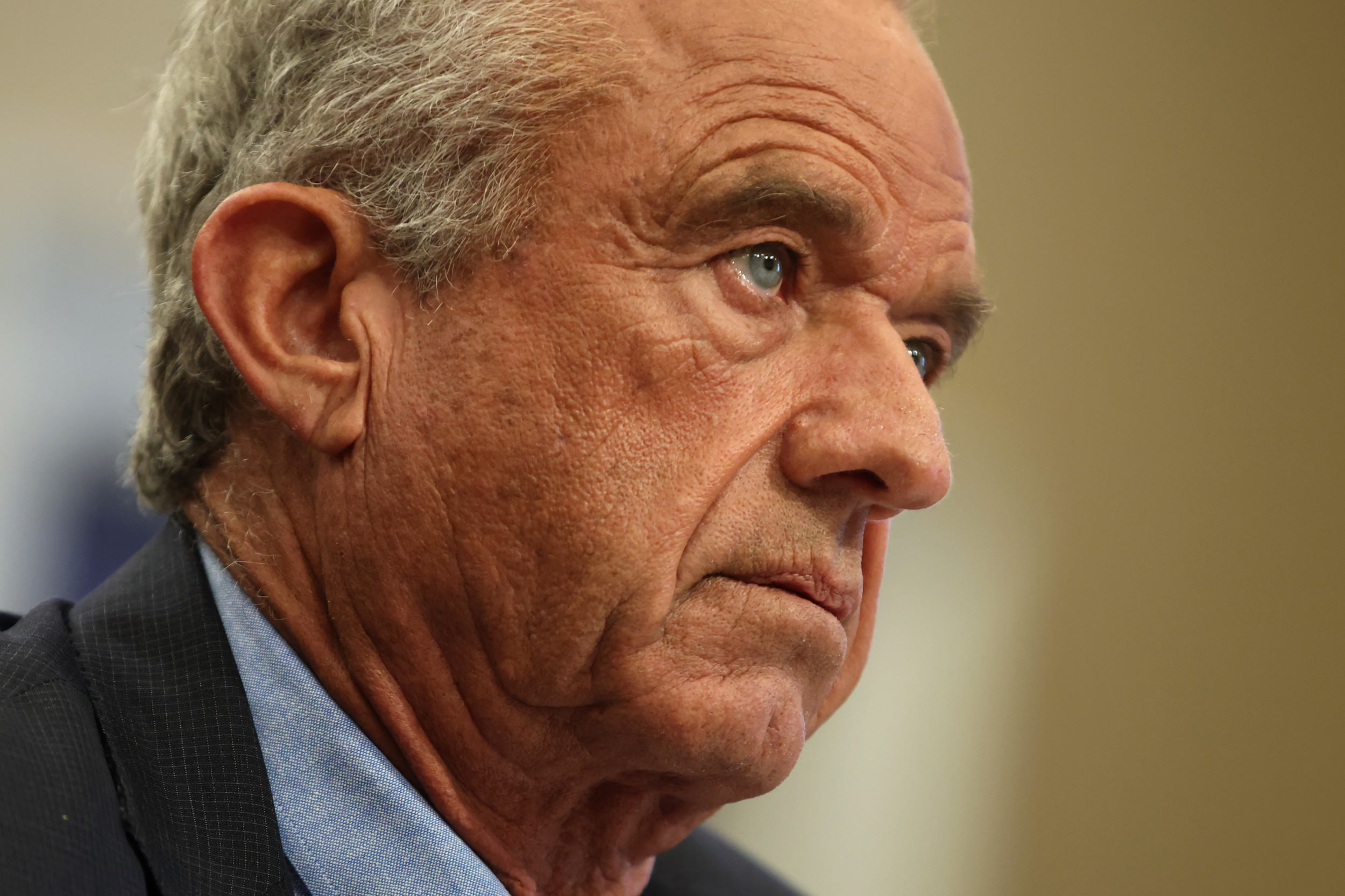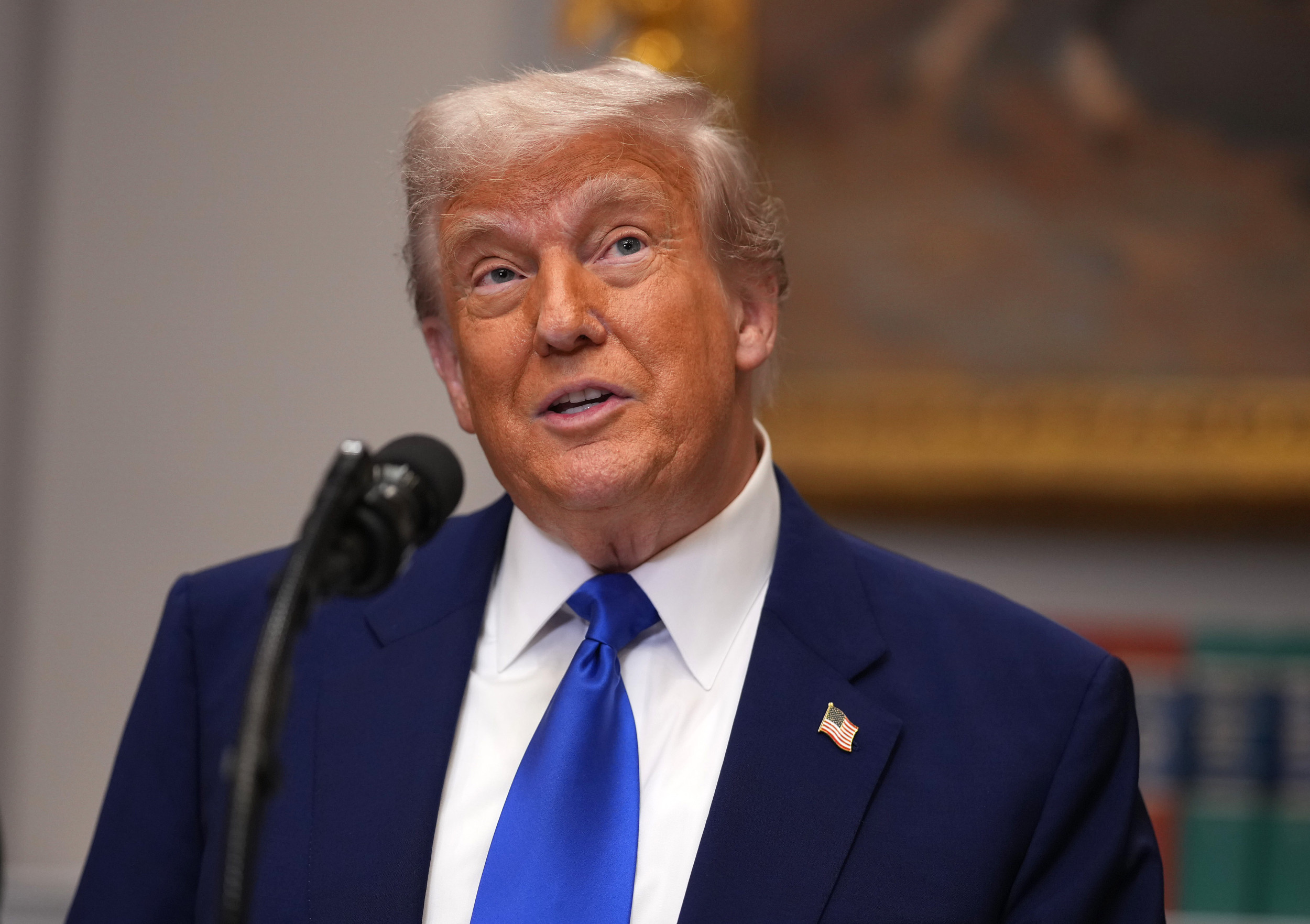Sanders Plans Bill Echoing Trump’s Move on Drug Prices: Live Updates
On Tuesday, Senator Bernie Sanders announced his intention to propose legislation that mirrors former President Donald Trump’s recent executive order aimed at reducing the cost of prescription drugs. This statement was made during Sanders’ address at the second joint hearing alongside independent presidential hopeful Robert F. Kennedy Jr.
What to know:
- Sanders, who leads the Democratic side of the Senate Health, Education, Labor, and Pensions Committee, expressed backing for Trump’s executive order even though he has reservations about its survival against potential legal hurdles.
- He mentioned that legislative measures are more dependable and plans to propose a bill with comparable objectives.
- Sanders extended invitations to both Kennedy and Trump to collaborate with him on the legislation.
- Kennedy said he would be open to collaborating with Congress to reduce drug costs.
Stay with
Big One News
for the latest updates.
President Donald Trump on Wednesday emphasized his preference for a peaceful resolution in ongoing nuclear negotiations with Iran, urging Iranian leaders to move forward with a deal. At a state dinner in Doha, Qatar, Trump described the talks as having only two potential paths — one friendly and one violent.
“There’s a friendly option and one that isn’t, which can be aggressive, but I prefer not to go down that path,” Trump stated. “Still, they need to make progress.”
The U.S. has been in active negotiations with Iran for several weeks, with special envoy Steve Witkoff leading the American delegation during the president’s visit to Qatar. While both nations have agreed to continue talks, Trump has offered few public details on what the final agreement should include, aside from a firm stance that Iran must not obtain a nuclear weapon.
The U.S. Health and Human Services Secretary, Robert F. Kennedy Jr., has faced criticism from members of both major political parties due to significant staff downsizing, halted research funding, and altered policies after assuming leadership of the department. At consecutive hearings held on Wednesday—one conducted by the Senate’s health committee and another by the House appropriations committee—Kennedy defended the administration’s suggested budget for his agency. The proposal entails decreases in spending aimed at preventing infectious diseases, supporting medical research, and aiding maternal healthcare initiatives. Concurrently, he advocated for an additional $500 million allocation towards his “Make America Healthy Again” program.
Kennedy stated that he decided to decrease the staff of the department from 82,000 to 62,000 workers as an essential step towards reducing costs and removing duplications, specifically within divisions focused on women’s health, minority health, and sexually transmitted disease control. Nevertheless, this strategy faced opposition from Democrats, who contended that these reductions could undermine vital healthcare programs like drug overdose intervention, cancer care services, and support for heating needs among impoverished households.
A major point of contention involved the suggested reduction of almost $20 billion from the budget of the National Institutes of Health (NIH). Democrats such as Senator Patty Murray voiced worries that these reductions could postpone therapies for individuals like Natalie, who has stage 4 cancer, whereas Kennedy found it challenging to specify how many positions were affected at the NIH.
Kennedy also defended the decision to eliminate funding for the Low-Income Home Energy Assistance Program (LIHEAP), but the move was met with resistance from Republicans like Sen. Lisa Murkowski of Alaska, who warned that the cuts would hurt those who rely on energy assistance in colder states.
Although some Republicans commended Kennedy’s emphasis on nutritious diets, he encountered scrutiny regarding various stances such as his position on synthetic food coloring and endorsements of adding fluoride to drinking water. Furthermore, Kennedy drew backlash from all quarters due to contentious remarks about vaccinations; public health officials contended that these statements are fueling an uptick in measles cases across multiple states.
As Kennedy encounters increasing opposition, his tenure as HHS leader continues to be a controversial topic in Washington.
California Governor Gavin Newsom has proposed freezing enrollment in the state-funded health care program for immigrants living in California without legal status to close a $12 billion budget deficit. This proposal is part of his nearly $322 billion spending plan for the upcoming fiscal year.
Newsom attributed the deficit to rising Medicaid spending, economic uncertainty, and the impact of federal tariff policies, notably blaming President Donald Trump’s policies for reducing state revenues by as much as $16 billion in the coming years.
The freeze on health care enrollment would apply to low-income adults without legal status starting in 2026. While those already enrolled will not lose coverage, the change also introduces a $100 monthly premium for adults with unsatisfactory immigration status beginning in 2027. The proposed changes are expected to save the state $5.4 billion by 2028-2029.
While Newsom defended his actions, highlighting California’s commitment to immigrants, some lawmakers, including Republican Assembly Leader James Gallagher, criticized the governor for his spending. Democratic leaders, such as Senator Dave Cortese, opposed scaling back health care coverage for immigrants, arguing that it goes against California’s values.
As President Donald Trump continues his Middle East trip, several Republican hardliners strongly oppose the House’s current version of his proposed healthcare bill. They argue that the legislation does not do enough to reform Medicaid or reduce the deficit, creating a challenge for House Speaker Mike Johnson in uniting differing factions of his conference.
Rep. Eric Burlison expressed concerns about the bill’s potential to increase the deficit, stating that he could not support it without changes. Rep. Chip Roy also predicted significant resistance, particularly over Medicaid provisions, which he argues are insufficiently reformed. Roy criticized the bill for adding more state and local tax (SALT) money, further complicating efforts to reach consensus.
Rep. Ralph Norman, another bill critic, stated that the current version was unlikely to pass without significant revisions, particularly to Medicaid work requirements. As Republicans remain divided, Speaker Johnson faces a tough road ahead to secure enough votes for the legislation’s passage.
Badar Khan Suri, a Georgetown scholar from India, was released from immigration detention Wednesday following a federal judge’s ruling. Immigration authorities had detained Suri under the Trump administration’s crackdown on foreign students, particularly those involved in campus protests over the Israel-Hamas conflict.
Suri, who was detained in Texas, will be reunited with his family in Virginia as he contests deportation and disputes the charges related to his improper detention. The U.S. authorities alleged that Suri backed Hamas, labeling it a terrorist organization, due to his activities on social media platforms and because of his spouse’s Palestinian American heritage.
U.S. District Judge Patricia Tolliver Giles approved Suri’s release, highlighting significant constitutional issues with the Trump administration and suggesting strong potential First Amendment protections for his statements. She stressed that the First Amendment shields everyone irrespective of their nationality, pointing out that Suri probably participated in safeguarded political discourse.
The case involving Suri has sparked extensive criticism from various civil liberty organizations, bringing attention to the issue of governmental actions against people due to their ideological beliefs. Attorneys representing him through the ACLU contended that detaining someone because of their thoughts is unacceptable, thereby emphasizing the critical necessity of upholding First Amendment protections.
Senator Josh Hawley from Missouri announced on Tuesday that he will introduce cross-party legislation at both chambers of Congress aimed at eliminating the tax deductions for drug advertisement expenses.
According to present legislation, pharmaceutical businesses have the ability to deduct their marketing costs from their taxes as an operating expense. However, Senator Hawley’s proposed bill aims to remove this tax advantage.
Independent presidential hopeful Robert F. Kennedy Jr. stated unequivocally that he fully backs the proposal and has held discussions on the matter with Treasury Secretary Scott Bessent.
“We anticipate releasing a policy within the coming several weeks,” Kennedy stated.
Boeing has clinched two substantial aircraft deals in the Middle East, notably a historic $96 billion contract with Qatar Airways during President Donald Trump’s visit to the area. This pact encompasses Boeing’s 787 and 777X wide-body planes and represents the largest single order for the company ever recorded by Boeing itself.
That’s quite decent,” Trump stated during the announcement. “Send those planes into action.
The agreement with Qatar comes after a distinct contract from a Saudi firm for 20 737-8 aircraft, including an option for another 10 planes. These developments indicate a resurgence of dynamism for Boeing, a company that has lately encountered significant examination and monetary setbacks.
The announcements come just days after China lifted a freeze on Boeing plane deliveries as part of a U.S. trade deal, further boosting the company’s outlook.
Still, controversy swirled as Trump accepted a luxury Boeing 747-8 from Qatar’s ruling family—a gesture critics say could violate constitutional rules against foreign gifts and pose security risks.
Boeing stock hit a 12-month high Wednesday, buoyed by the news and continuing a five-day rally.
Lawmakers from both parties on Wednesday expressed concern over the sweeping staffing reductions, research funding freezes, and significant policy shifts implemented by U.S. Health and Human Services Secretary
Robert F. Kennedy Jr.
during his brief tenure leading the department.
As Kennedy defended the White House’s requested budget for his agency, he told Senator Patty Murray of Washington
that suggested reductions in funding for the National Institute of Health (NIH)
would “hurt.”
In response to a query regarding the reductions, Kennedy stated, “Part of what I’m saying is that the decreases suggested by NIH will be detrimental,” as tensions ran high. He continued, emphasizing, “No administrator within the government, including me, would prefer seeing our funding diminished.”
Check out the complete article by Gabe Whisnant on Big One News.
Trump met Wednesday with Syria’s new leader, Ahmad al-Sharaa, a former al-Qaida fighter once held by the U.S. military and previously listed with a $10 million bounty on his head. The meeting, facilitated by Saudi and Turkish leaders, marked a dramatic shift in al-Sharaa’s path from jihadi insurgent to head of state.
Trump commended al-Sharaa as a “youthful and appealing individual” with an “impressive history.” He also committed to removing economic penalties applied against the administration of former Syrian leader Bashar Assad. Al-Sharaa, instrumental in leading the rebellion that overthrew Assad last December, vowed to steer Syria towards a fresh direction following over ten years of conflict.
Previously known as Abu Mohammed al-Golani, al-Sharaa formerly headed al-Qaeda’s Syrian affiliate. He transformed the organization over time, moving away from its extremist origins, which earned him backing from major local governments. Following his ascent, the U.S. removed his group from its list of designated terrorists. His recent handshake with President Trump symbolized official acknowledgment of this shift in status.
Still, al-Sharaa faces enormous hurdles. The Syrian economy is shattered, much of the country lies in ruins, and recent sectarian violence has reignited fears of instability. An Israeli military campaign in southern Syria and simmering tensions among ethnic groups have also tested his early leadership.
Despite the challenges, Trump expressed cautious optimism. “They have a lot of work to do,” he said, “but he’s got a real shot.”
The White House announced Tuesday that President Donald Trump has signed an agreement with Qatar valued at more than $1.2 trillion, though it did not release any documentation to support the figure.
NBC News reported it could not independently verify the accuracy of the claim. In a statement, the White House also touted more than $243.5 billion in economic deals, including a major sale of Boeing aircraft and GE Aerospace engines to Qatar Airways.
Trump is currently visiting Qatar as part of his first foreign trip since beginning his second term.
A federal judge on Wednesday temporarily blocked the Trump administration from enforcing part of an executive order that would strip Foreign Service employees of their collective bargaining rights.
U.S. District Judge Paul Friedman granted the American Foreign Service Association’s request for a preliminary injunction while the union’s lawsuit against the administration moves forward. The union, representing over 18,000 Foreign Service employees, argued that President Trump’s March 27 order unlawfully removed bargaining protections at the State Department and U.S. Agency for International Development.
Union attorneys said the move was retaliatory and not about national security, as the administration claimed. Government lawyers argued Trump had the authority to act in the public interest and remove restrictive labor agreements from national security-focused agencies.
Friedman previously halted a similar order affecting federal workers in other departments. His latest ruling keeps union protections in place for now, though the administration is appealing past decisions.
Governor Gavin Newsom of California has suggested halting admissions for low-income undocumented immigrants into the state’s Medi-Cal program from 2026 onwards. Additionally, current participants would start paying monthly fees beginning in 2027.
This shift occurs as the state faces financial pressures from its budget constraints and an increasing expense related to the expanded healthcare initiative. On Wednesday, Newsom mentioned that the program had incurred $2.7 billion more than anticipated, attributing this extra burden primarily to escalating pharmaceutical expenses, efforts towards recovering from wildfires, and trade tariffs that have diminished tax income.
Beginning in 2027, undocumented adults along with individuals having an “incomplete immigration status,” who are currently part of Medi-Cal, will be required to pay $100 each month for their coverage. These modifications won’t impact children’s benefits nor terminate the present coverage for those already included in the program during this freeze period.
The relocation initiative is anticipated to save the state $5.4 billion by 2029; however, it has faced criticism from supporters of immigrants’ rights. “This plan does not align with what we stand for as a state,” stated Masih Fouladi from the California Immigrant Policy Center.
This week, during his trip to the Middle East, President Donald Trump publicly expressed appreciation for the opulence and contemporary styling of his Arabian hosts’ environment, while simultaneously bemoaning the perceived obsolescence of America’s presidential equipment.
From being impressed by Qatar’s “perfecto” marble to commending Saudi Arabia’s skyline, Trump consistently compared the opulence of the Gulf nations to his perception of a “much smaller” and “less flattering” Air Force One. He went so far as to suggest considering a Boeing 747 offered by Qatar, disregarding possible security risks and constitutional complications associated with receiving such an international gift.
The president, famous for his opulent preferences, seemed captivated by the area’s magnificence. During his visit to Qatar, he addressed Emir Tamim bin Hamad Al Thani saying, “They refer to this as perfection,” pointing out the palace marbles. Elsewhere, he praised golden swords, traditional camel-back welcomes, and fighter jet escorts.
It appears that the trip has reignited Trump’s desire to refresh the look of the American presidency. He has suggested installing a $100 million Mar-a-Lago-inspired ballroom at the White House instead of using tented structures for state dinners. Additionally, he plans to overhaul the Rose Garden with new stonework. The Oval Office now features gold embellishments along with a customized version of Air Force One.
“We have moved past the tent setup,” Trump recently stated, furthering his efforts to mold the presidency into his grandiose vision.
Representative Rosa DeLauro, who leads the House Appropriations Committee as the senior Democrat, voiced her anger on Wednesday at Health and Human Services Secretary Robert F. Kennedy Jr.’s decision not to promote childhood immunizations for diseases such as measles, chickenpox, and polio.
“I’m horrified,” DeLauro said in her closing remarks at a budget hearing. “Vaccines save lives, and the fact that the secretary of Health and Human Services refuses to encourage children to be vaccinated is a tragedy.”
DeLauro pointed to two recent measles-related deaths in the U.S. and warned that public health is at risk if vaccine uptake continues to drop.
She also criticized the administration’s budget plans, accusing it of trying to illegally block funding for the National Institutes of Health and proposing a $20 billion cut in 2026. “The havoc that we are going to cause in dealing with research is going to put lives at risk,” she said.
Super Micro Computer shares climbed 12.7% on Wednesday following a new partnership with Saudi Arabian data center firm DataVolt. The deal signals expansion opportunities for Super Micro in the Middle East and strengthens its presence in the global server market.
Meanwhile, the S&P 500 index has recovered all its earlier losses since President Donald Trump escalated his global trade war. The index now sits just 4.2% below its all-time high from February.
Even with Trump postponing some of the toughest tariffs, both businesses and shoppers stay cautious. The continuous ambiguity and erratic trade actions have complicated planning for firms and eroded consumer confidence in spending.
According to a municipal official, a child was allegedly found unattended on a street during a federal immigration operation in Waltham, Massachusetts, earlier this month.
Big One News
has contacted the
Department of Homeland Security
for comment.
President
Donald Trump
Since resuming his position in January, he has implemented significant alterations to immigration policies and instructed his administration to deport millions of individuals who are living in the country without proper documentation.
flagship mass deportation policy
The White House has indicated
any individual residing in the country without legal permission
has committed crimes and has relocated to
revoke the temporary legal status
Of hundreds of thousands of migrants, critics argue that enhanced immigration enforcement measures are instilling fear within these communities.
Check out the complete article by Billal Rahman on Big One News.
House Speaker Mike Johnson declined to comment Wednesday on Donald Trump’s reported plans to accept a free plane from Qatar to replace Air Force One, saying the issue is outside his responsibilities.
“It’s not my lane,” Johnson said during a news conference. He later added that he doesn’t believe the emoluments clause would apply in this case, since the aircraft would be a personal gift to the country rather than to Trump.
Johnson said he hasn’t been closely following the matter, noting his current focus is on passing a budget reconciliation bill.
Trump’s announcement that the U.S. will ease sanctions on Syria could mark the start of the country’s economic recovery after years of civil war. However, experts caution that progress will be slow and the path will be unclear.
Sanctions on Syria have been in place for decades, beginning in 1979 when the country was labeled a sponsor of terrorism. Later measures, including the 2003 Syria Accountability Act and the 2019 Caesar Act, targeted the Assad regime’s military actions, human rights abuses, and support for armed groups.
Although the relaxation of sanctions has sparked jubilation in Syria and garnered backing from nearby authorities, experts in economics believe that genuine transformation hinges on the extent of assistance provided. Syria urgently requires funding to reconstruct its infrastructure and alleviate pervasive destitution.
Economic sanctions have significantly hampered Syria’s financial situation, impacting all areas from import activities to delivering humanitarian assistance. Despite short-term exceptions, such as those granted following the 2023 earthquake, these measures haven’t been notably effective because of excessive adherence by international banking institutions and enterprises.
Trump’s commitment has instilled hope that Syria might reintegrate into the international financial sphere and secure funds for rebuilding efforts. However, complete rehabilitation hinges on lifting numerous layers of limitations—a procedure expected to require considerable time.
A Republican member of
Congress
had to be roused after what he called a “short power nap.”
Big One News
, during an early morning session of a committee markup on Wednesday.
The House Ways and Means Committee held a lengthy markup session lasting several hours to deliberate on a comprehensive reconciliation bill that encompasses measures proposed by President
Donald Trump
The discussion around tax reductions took place during an extended session that continued until early Wednesday. Lawmakers engaged in debates and votes regarding potential additions of particular amendments to the legislation.
The legislation, if passed, could have
implications for some social programs
like the Supplemental Nutrition Assistance Program (SNAP). But it faces a closely divided Congress, where
Republicans
hold only a seven-seat majority, meaning there could only be a few defections for the bill to pass.
GOP Representative Blake Moore of Utah briefly dozed off during a vote on an amendment raised by Representative Judy Chu, a California Democrat, during the meeting.
Chu proposed an amendment that she said would protect automatic enrollment into the Affordable Care Act from a measure that would require families to manually verify their income each year. Chu argued that would hurt Americans like gig workers who cannot accurately predict their yearly income.
When it came time to vote on whether to include the amendment, Moore had fallen asleep and had to be woken up by Representative Michelle Fischbach, a Minnesota Republican, sparking laughter from other lawmakers. Moore himself joined in on the laughter before voting against the amendment.
Read the full story by Andrew Stanton on Big One News.

Health and Human Services Secretary Robert F. Kennedy Jr. was questioned at a recent congressional hearing regarding vaccinations for his children. During this session, when asked whether he would inoculate his offspring against measles now, he hesitated but indicated that he might choose to do so. Nonetheless, he swiftly added that his stance on vaccines holds little importance and advised that individuals ought not seek medical guidance from him.
Kennedy, who was previously an outspoken opponent of vaccinations prior to entering the Trump administration, chose not to respond when asked if he would immunize his offspring against chickenpox or polio—both vaccines renowned for their safety and efficacy. Under further questioning, he restated that he preferred not to provide guidance on this issue, stressing instead that his group’s objective was to outline the “advantages and disadvantages.”
Kennedy has previously endorsed unconventional therapies for measles, such as the use of the steroid budesonide, the antibiotic clarithromycin, and cod liver oil—all of which are not advised by medical professionals for this condition. Health experts have cautioned that large amounts of vitamin A, commonly present in cod liver oil, could pose risks, particularly to young kids.
When aboard Air Force One, Trump
met with reporters
Offering insights into his latest diplomatic efforts and foreign policy strategies, he shared observations spanning multiple subjects. These included conversations with Syrian President Bashar al-Assad, his position regarding Syria potentially entering the Abraham Accords, as well as perspectives on the continuous regional disputes in the Middle East.
Trump described his meeting with Assad as positive, praising the Syrian president’s strength and leadership. He also mentioned his talks with Turkish President Erdogan, calling him a supportive figure for Assad. However, Trump stated that Syria had much work to do before it could be considered for the Abraham Accords, although he believes they eventually will join.
Trump highlighted that his diplomatic initiatives had positive implications for Israel within the region, underscoring the wider advantages of his ties with various nations across the Middle East. While he recognized Israel’s role in releasing hostages, Trump also underlined the significance of active U.S. participation in addressing such issues.
In response to inquiries regarding his possible involvement in a meeting with Russian President Vladimir Putin, Trump indicated that such an encounter might still take place, although he was unsure whether Putin would attend. Furthermore, Trump touched upon the issue of sanctions, suggesting that supplementary penalties targeting Iran could be enforced if needed to stop Iran from developing nuclear arms.
Trump also fielded questions about his family’s involvement in crypto and discussed his stance on crypto leadership, stating that the U.S. must lead in the sector or risk China taking the lead. He also responded to Senator Chuck Schumer’s remarks about blocking political nominees, calling Schumer’s behavior increasingly erratic.
During an House budget hearing on Tuesday, Transportation Secretary Sean Duffy encountered initial bi-partisan backlash from lawmakers who voiced their concern about reductions in personnel and programs within the Department of Transportation.
The hearing came amid mounting air travel issues, including delays and cancellations at Newark airport, which officials blame on Federal Aviation Administration staffing shortages and technology problems.
Rep. Steve Womack, R-Ark., chair of the appropriations subcommittee, warned against restructuring the department or withholding funds without congressional oversight. “Efforts to restructure the Department of Transportation without congressional approval… concerns me,” he said.
Ranking member Rep. Jim Clyburn, R-S.C., echoed the unease, citing deep concern over reduced staffing and unspent appropriations.
On Wednesday, Trump’s visit to Qatar began with an unusual show of military pageantry: a ceremonial F-15 fighter jet escort as Air Force One entered Qatari airspace. It mirrored a similar gesture from Saudi Arabia the day before, as both nations sought to impress the president during his Middle East trip.
White House aide Margo Martin posted video clips of the flights, calling the experience “what a view flying into Qatar!!!” and highlighting the rare escort as a sign of honor. One Qatari pilot even snapped a photo of Air Force One midair.
Beyond the escort, Qatar has offered Trump a luxury Boeing 747-8, potentially to serve as Air Force One while Boeing completes newer models. Trump has defended the idea as cost-effective, though critics have raised alarms over the ethical and national security implications of accepting such a gift from a foreign government.
On Thursday, Trump proceeds with his regional visit, heading to the United Arab Emirates.
The U.S. Department of Commerce has withdrawn a Biden-era rule that would limit exports of artificial intelligence chips to over 100 countries without federal approval. The rule, set to take effect Thursday, was reversed following complaints from the tech industry and foreign governments.
In their guidelines, the department stated that the limitations “would have hindered American innovation and imposed cumbersome new regulatory demands on businesses.”
The initial framework, put into place by former President Joe Biden prior to his departure from office, aimed at striking a balance between safeguarding national security and advancing economic interests. Although current export restrictions were primarily focused on nations such as China and Russia, this new regulation was intended to introduce more extensive limitations, even affecting American allies in the Middle Eastern region.
Leading semiconductor companies such as Nvidia and AMD contested the proposal, cautioning that it might drive potential purchasers towards rivals like those based in China. Microsoft President Brad Smith informed legislators that this policy conveyed to more than 100 nations that the U.S. was no longer considered a dependable source for AI technology.
Jeffrey Kessler, the Commerce Undersecretary under the Trump administration, stated that they would develop a fresh export strategy centered around collaboration with reliable allies. The European Commission expressed approval for this change, noting that it would aid in sustaining robust diplomatic and economic relationships between the U.S. and Europe.
Iran’s Foreign Affairs Minister has criticized the U.S. President for his actions or statements.
Donald Trump
‘s recent remarks about Tehran, accusing Washington of decades of sabotage and of covering up Israeli crimes in the region.
President Donald Trump described Iran as the “most destabilizing force in the area” during his prominent trip to Saudi Arabia.
Reuters
reported.
Big One News
has reached out to the White House for comment.
Why It Matters
The remarks underscore
tensions
between the U.S. and Iran amid ongoing nuclear talks with Trump saying he hopes to achieve an agreement that would prevent Iran from acquiring nuclear weapons. If talks fail, he has threatened possible
military action
. Iran says it seeks only a peaceful nuclear program, but will defend itself against any attack.
Read the full story by Amira El-Fekki on Big One News.
Republicans in Congress are hurriedly working to approve an extensive legislative bundle encompassing tax relief measures, reduced expenditures, tougher job prerequisites for assistance initiatives, and increased financial support aimed at bolstering border safety. This comprehensive plan has been labeled as “The One, Big, Beautiful Bill,” echoing President Donald Trump’s style. The objective is to fulfill numerous pledges made during his election campaign. House Speaker Mike Johnson anticipates getting this legislation through before Memorial Day.
The plan encompasses over $5 trillion in tax reductions, offset by decreases in clean energy incentives and increased opportunities for oil and gas exploration. This initiative would make permanent the tax breaks from the Trump era and introduce new deductions such as those for gratuities and automobile financing interests.
Other significant measures include imposing tougher work requirements for those receiving Medicaid and food aid, transferring a greater share of SNAP expenses to state governments, and revamping student loan repayment plans. Additionally, federal pension benefits would be reduced, and activities on public land would expand.
The main emphasis is on border control, with a proposal of $69 billion allocated for building walls, deportation efforts, and hiring additional immigration personnel. The overall defense spending would increase by $150 billion, which includes $25 billion earmarked for an intended missile defense system known as the “Golden Dome.”
Democrats have pledged to contest the bill. House Minority Leader Hakeem Jeffries described it as “extreme and hazardous,” and opponents argue that it will dismantle essential social welfare initiatives and intensify ecological deregulations.
President Donald Trump’s return trip during his potential second term has sparked worries about how much his family’s international business activities might intertwine with American diplomatic strategies. While Trump visits Saudi Arabia, the UAE, and Qatar, his children are broadening the reach of the Trump Organization across these areas. This includes developing Trump Tower Dubai along with high-end initiatives planned for Saudi Arabia, Oman, and Qatar.
Experts argue that the widening commercial activities of the Trump family within the Gulf region have sparked significant ethical concerns. These issues are particularly pronounced due to extravagant presents such as a $400 million aircraft from Qatar and a substantial $2 billion cryptocurrency arrangement connected with Trump’s financial entity, World Liberty Financial. Despite these dealings, Trump maintains he isn’t involved but still benefits from his brand recognition.
The administration asserts that Trump is adhering to conflict-of-interest regulations. Press Secretary Karoline Leavitt dismissed these worries as “unfounded,” emphasizing that the president’s properties are managed through a trust overseen by his offspring. Nonetheless, specialists in ethical conduct argue that this arrangement still permits transactions involving private international firms—a notable divergence from previous practices during his initial term.
The schedule itself poses queries. His initial destination was Saudi Arabia, where he mentioned an investment commitment of $600 billion from the U.S. Additionally, the UAE has committed another $1.4 trillion for the coming ten years. Supporters argue that his entrepreneurial achievements bolster his political allure; however, critics express concern that this apparent quid pro quo approach might diminish faith among the populace.
The Trump Organization’s ties to Gulf leaders date back nearly two decades, with real estate moguls like Hussain Sajwani, head of DAMAC Properties, playing central roles. Trump once claimed he turned down a $2 billion deal with Sajwani, a figure now investing heavily in Trump-linked U.S. data centers.
Even some conservatives say the appearance of self-enrichment is troubling. “When he leaves the White House, the company is worth more,” said AEI fellow Timothy P. Carney. “His personal wealth goes up.”

The MeidasTouch Podcast
, a show critical of President
Donald Trump
, has won Podcast of the Year at the Webby Awards.
Big One News
reached out to those involved after normal work hours through email for their input.
The left-leaning
MeidasTouch Podcast
has consistently topped the podcast charts since President Donald Trump began his second term, surpassing well-known podcasts that previously held the number one spot.
Joe Rogan
It has remained steadfast as the nation’s top-downloaded podcast, suggesting a change in what Americans wish to listen to.
Check out the complete article by Marni Rose McFall on Big One News.
The Democratic National Committee intends to display a banner above Donald Trump’s Mar-a-Lago property in Florida today, ridiculing his connections to Qatar and the broader Middle Eastern region. This banner, which reads “Qatar-a-Lago,” is set to be flown from 11 a.m. to 3 p.m. ET, aligning with Trump’s journey to Qatar for what marks his initial overseas excursion during his second presidential term.
This action comes after criticisms regarding the Trump administration’s agreement to accept an opulent Qatar Airways aircraft for potential use as Air Force One. In response, Senator Chuck Schumer has declared his intention to block confirmations of Justice Department nominees until additional details are disclosed.
Trump and his family have longstanding business interests across the Middle East, including real estate and golf ventures. In a statement, DNC Chair Ken Martin said the banner was meant to highlight Trump’s alleged self-dealing.
“Trump shows no loyalty to the American people, national security, or the Constitution; his sole commitment is to his finances and his wealthy associates,” according to Martin.
Israel Vail, a small business owner in the Guatemalan town of Cajolá, relies entirely on his children’s money from the U.S. for his livelihood. Their remittances built his home, funded his store, and kept his family afloat. But new proposals from President Donald Trump and House Republicans have stirred deep concern in communities like his.
A bill backed by House Republicans would impose a 5% tax on money transfers sent by non-citizens, including green card and visa holders. Trump has also signaled he may issue a directive to block remittances sent by undocumented immigrants entirely.
In Guatemala’s countryside, remittances are crucial for economic activities such as employment, construction of homes, and funding educational opportunities. However, experts caution that imposing taxes or limitations on these transfers might have adverse effects on both the American economy and levels of immigration. It could also compel individuals to resort to unofficial methods for sending money.
Supporters of Trump claim that this tax would deter unlawful migration and curb unauthorized monetary movements. However, opponents contend that it would adversely affect households and enterprises reliant on these funds for their livelihoods.
When Donald Trump emerged victorious, numerous individuals ceased sending remittances or started conserving their money,” stated Vail. “There was a significant decline in business activity as a result.
On Wednesday, Trump
condemned Senate Minority Leader Chuck Schumer
, indicating that the Democratic senator appears to be “unwell” following their decision to place a blanket hold on all Justice Department political appointees.
“There’s an issue with him; I’m not sure what,” Trump said to reporters as he traveled on Air Force One to Qatar. “He has completely lost his self-assurance. Plus, there seems to be something amiss with him.”
Schumer’s move comes as he demands more information about the Trump administration’s reported plans to accept a luxury aircraft from Qatar’s royal family for use as Air Force One. He’s also calling on the Justice Department’s Foreign Agents Registration Act Unit to disclose any activities by Qatari foreign agents that could benefit Trump or his businesses.
While Schumer’s hold doesn’t block confirmations outright, it forces Republicans to spend additional Senate floor time to advance each nominee individually.

Democratic Representative Shri Thanedar on Tuesday moved to force a House vote on his articles of impeachment against President
Donald Trump
.
Thanedar took to the House floor on Tuesday afternoon to notice his seven articles of impeachment as privileged.
That means House
Republican
leaders have two legislative days to discuss the resolution. They are most likely to introduce a motion to table it, which would effectively kill it.
Thanedar
introduced the articles of impeachment
, which accuse Trump of offenses including obstruction of justice, bribery and corruption, and tyrannical overreach, last month.
“It’s time for us to act,” he stated on X, previously known as Twitter.
Twitter
On Tuesday, he stated, “I urge my colleagues from all parties to back my articles of impeachment, uphold your oaths, defend this nation, and safeguard the American people. There’s never an inappropriate moment to champion our Constitution.”
Check out the complete article by Khaleda Rahman on Big One News.
On Wednesday, Trump mentioned that he is still considering attending the forthcoming peace negotiations in Turkey involving Russia and Ukraine. He informed journalists that Russian President Vladimir Putin has shown an interest in having him present at these discussions.
“I believe he wants me to be present, and that’s an option,” Trump stated when talking to journalists on Air Force One. “Should we manage to conclude the war, I’d consider it.”
The president mentioned that his Thursday calendar is completely filled, yet he stated this wouldn’t prevent him from going to the discussions if doing so had the potential to “save many lives.” He also expressed uncertainty about whether Putin would attend if Trump himself did not make an appearance.
Although Trump previously indicated he was considering attending, he announced on Tuesday that Secretary of State Marco Rubio would head the U.S. delegation in his place. The White House has likewise verified that special envoys Steve Witkoff and Keith Kellogg will be present at the discussions in Ankara.
Trump told Gulf leaders on Wednesday that the U.S. is eager to strike a deal with Iran over its nuclear program—but only if Tehran ends its support for proxy militias across the region.
Trump stated during a meeting with Gulf Cooperation Council leaders in Riyadh that Iran needs to cease supporting terrorism, end its violent proxy conflicts, and irreversibly and inspectably abandon the development of nuclear arms. He also emphasized that Iran should not possess a nuclear weapon.
The U.S. and Iran have held multiple talks in recent weeks, though Trump warned that the opportunity to reach an agreement is narrowing. His comments come amid Iran’s setbacks in Gaza, Lebanon, and Yemen, where its allied groups have faced significant military and political losses.
Later, aboard Air Force One, Trump added: “We’ll either do it friendly or we’ll do it very unfriendly. And that won’t be pleasant.”
In a rare face-to-face meeting, Trump also met with Syria’s new interim president, Ahmad al-Sharaa. The former insurgent, once linked to al-Qaida, now leads the country after the Assad regime’s fall. Trump praised al-Sharaa as a “young, attractive guy” and announced plans to lift longstanding U.S. sanctions on Syria, a move endorsed by Saudi and Turkish leaders.
Trump continues his regional tour with a stop in Qatar, where he will receive a state welcome.

Syrian President Ahmed al-Sharaa, the heavily-bearded former Islamist insurgent who was once the target of U.S. counterterrorism operations, has taken another step towards full acceptance under President
Donald Trump
.
During his visit to Saudi Arabia, Trump declared his intention to remove sanctions from Syria following the downfall of the previous president’s Iran-supported government.
Bashar al-Assad
.
Trump’s
announcement
Indicates a change in tone during the Trump administration and represents a considerable diplomatic success for Syria’s leader. This comes as a result of covert maneuvers by several Middle Eastern leaders who are working towards reintegrating the strife-ridden nation into the region following more than ten years of warfare. For an extended period, the U.S. has imposed sanctions on Syria due to allegations of human rights violations and involvement in terrorist activities.
Check out the complete article by Amira El-Fekki on Big One News.
Related Articles
-
What Has Robert Kennedy Jr. Shared Regarding His Vocal Cord Disorder?: Spasmodic Dysphonia
-
IsraelIssues Alerts to Syria and Turkey as Trump Commends TheirLeaders
-
Judge References Trump’s Supreme Court Immunity Ruling in Attempt to Dismiss ICE Case
-
Trump’s $600 Billion Investment Agreement with Saudi Arabia: The Details Unveiled So Far





